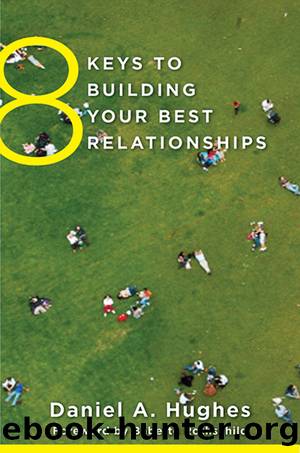8 Keys to Building Your Best Relationships (8 Keys to Mental Health) by Daniel A. Hughes

Author:Daniel A. Hughes
Language: eng
Format: epub
Publisher: W. W. Norton & Company
KEY 5
BUILD YOUR EMOTIONAL COMPETENCE
Ann Marie was in her second month at the clinic where she worked as a speech therapist when she started to spend some of her free time with Brenda, an occupational therapist. They had a lot in common and enjoyed their lunches together. She envisioned Brenda as a friend to get together with once in a while on weekends. If only Brenda didnât like Christine so much! Ann Marie didnât see what she saw in her. Christine seemed shallow and moody and too into drama. It didnât really matter though; she and Brenda were just friends.
As the months went on Ann Marie liked spending more and more time with Brenda. Ann Marie felt safe with her, they had a lot of fun together, they helped each other through the frustrations of work and going out with guys, and they exchanged little gifts. As these positive experiences and related emotions increased, so too did some distressing ones. Ann Marie would often feel disappointed when Brenda had commitments with others, or when she was withdrawn or irritable. She became a bit jealous when Brenda mentioned that she and Christine had made plans to do something together. She became angry when Brenda did not remember her birthday. She was hurt when Brenda didnât seem interested when she told her about how worried she was about her sisterâs divorce.
As relationships develop, they are tinged with more and more emotions. Great! Emotions add vitality to our lives. Emotions give energy to our thoughts and actions. However, just as relationships engender enjoyable emotions, they create stressful ones. Qualities that we like about a relationship tend to have parallel qualities that we do not like. We like that we spend time with a person, but we donât like that there are times when we are not together. We like when our friend is interested in a story weâre telling, but we donât like it when our friend does not appear to be interested in our story. We like knowing that we can rely on someone in some things, we donât like that we canât rely on the same person for other things. As sharing what we have in common becomes more enjoyable to us, conflicts become more stressful. The more important the relationship becomes, the more intense are the emotionsâboth positive and negativeâassociated with it. If we want to avoid intense relationships, we might choose to avoid having important relationships. Of course, we might then find ourselves struggling with emotions associated with loneliness.
It is relevant here to consider that the word mind refers to the flow of energy and information in our brain. (This clear, succinct, definition of mind is presented by Dan Siegel in many of his writings, including The Developing Mind, referred to earlier.) Our reflective functioning represents an important component of the information in our mind, while our emotions represent the energy of our mind. Remember from the previous chapter, reflective functioning is what our minds consider, and emotional functioning is how our minds consider it.
Download
This site does not store any files on its server. We only index and link to content provided by other sites. Please contact the content providers to delete copyright contents if any and email us, we'll remove relevant links or contents immediately.
We Need to Talk by Celeste Headlee(5394)
Pre-Suasion: A Revolutionary Way to Influence and Persuade by Robert Cialdini(3954)
Captivate by Vanessa Van Edwards(3705)
I Love You But I Don't Trust You by Mira Kirshenbaum(3686)
Goodbye Paradise(3424)
Surrounded by Idiots by Thomas Erikson(3388)
How to Win Friends and Influence People in the Digital Age by Dale Carnegie & Associates(3347)
How to win friends and influence people by Dale Carnegie(3252)
Fluent Forever: How to Learn Any Language Fast and Never Forget It by Gabriel Wyner(2900)
The Hard Questions by Susan Piver(2807)
The Dictionary of Body Language by Joe Navarro(2804)
The Story Factor: Inspiration, Influence, and Persuasion through the Art of Storytelling by Annette Simmons(2471)
Just Listen by Sarah Dessen(2432)
How to Be Yourself by Ellen Hendriksen(2262)
The Power of Moments by Chip Heath & Dan Heath(2165)
Behave: The Biology of Humans at Our Best and Worst by Robert M. Sapolsky(2156)
How to Make Small Talk by Melissa Wadsworth(2094)
Not Nice: Stop People Pleasing, Staying Silent, & Feeling Guilty... And Start Speaking Up, Saying No, Asking Boldly, And Unapologetically Being Yourself by Dr Aziz Gazipura PsyD(2059)
The Small BIG Small Changes that Spark Big Influence by Steve Martin & Noah Goldstein & Robert Cialdini(1787)
